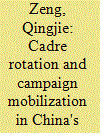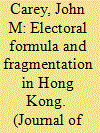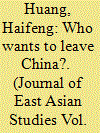| Srl | Item |
| 1 |
ID:
153318


|
|
|
|
|
| Summary/Abstract |
In authoritarian regimes, anticorruption measures are fundamentally mechanisms of controlling agents at various levels. To do this, the principal can either rely on routine bureaucratic management or resort to ad hoc, intense mobilization to discipline its agents. Using China as a case study, this article explores which mode of top-down control exerts greater influence on the pattern of anticorruption enforcement. We focus on the cadre rotation system as an example of routine management techniques and examine its effects on provincial level enforcement. We also investigate how provinces respond to the central government's periodic call to intensify anticorruption efforts. Based on provincial enforcement data from 1998 to 2013, our analysis finds that the proportion of rotated officials has little impact on enforcement outcomes. Rather, the vigor of enforcement in the provinces responds strongly to national policy priorities, suggesting a highly centralized disciplinary system. Moreover, provinces of greater political importance are under more central pressure to conform. The findings challenge the often-made argument that stable institutions are effective in fostering top-down control in authoritarian regimes, and suggest that campaign mobilization continues to be an essential instrument at the dictator's disposal.
|
|
|
|
|
|
|
|
|
|
|
|
|
|
|
|
| 2 |
ID:
153320


|
|
|
|
|
| Summary/Abstract |
The directly elected representatives to Hong Kong's Legislative Council are chosen by list proportional representation (PR) using the Hare Quota and Largest Remainders (HQLR) formula. This formula rewards political alliances of small to moderate size and discourages broader unions. Hong Kong's political leaders have responded to those incentives by fragmenting their electoral alliances rather than expanding them. The level of list fragmentation observed in Hong Kong is not inherent to PR elections. Alternative PR formulas would generate incentives to form broader, more encompassing alliances. Indeed, most countries that use PR employ such formulas, and the most commonly used PR formula would generate incentives opposite to HQLR's, rewarding broader electoral alliances rather than divisions.
|
|
|
|
|
|
|
|
|
|
|
|
|
|
|
|
| 3 |
ID:
153321


|
|
|
|
|
| Summary/Abstract |
Segregation has long been recognized as a source of ignorance which breeds negative feelings and hostility. This view maintains that interactions between members of different groups can foster social bonds and promote positive group relationship. Employing recently collected survey data, this study examines the effect of cross-Strait contacts on Taiwan citizens’ negative views toward Chinese citizens and the Beijing government. The empirical results show that casual encounters have no effect on the island residents’ general perception of China. Serious interactions in the form of friendship moderate their unfavorable feelings of Chinese citizens but have no effects on the perception of a hostile Beijing. Unless contacts can invoke true social bonds, frequent interactions do not have transformative effects on individuals’ political views. The moderating effect of contacts at the personal level is not transferable to a political entity when the latter is perceived as a suppressing agent.
|
|
|
|
|
|
|
|
|
|
|
|
|
|
|
|
| 4 |
ID:
153319


|
|
|
|
|
| Summary/Abstract |
Why are Chinese people moving abroad in unprecedented numbers? Using unique experimental and survey data, this research finds that Chinese citizens with more positive perceptions and, especially, overestimation of foreign socioeconomic conditions are more interested in going abroad. Moreover, correcting socioeconomic overestimation of foreign countries reduces their interest in leaving China, indicating that there is a causal effect from rosier perceptions of foreign conditions to higher interest in going abroad, and emigration does not always represent well-informed “voting with the feet.” The relationship between international political knowledge and exit intentions, on the other hand, is not significant or consistent, suggesting that Chinese citizens’ interest in going abroad is more socioeconomic than political in nature. These results contribute to the study of citizen misinformation, challenge a prevalent assumption in the international migration literature, and help us understand one of the most important social trends in the world's largest developing and authoritarian country.
|
|
|
|
|
|
|
|
|
|
|
|
|
|
|
|